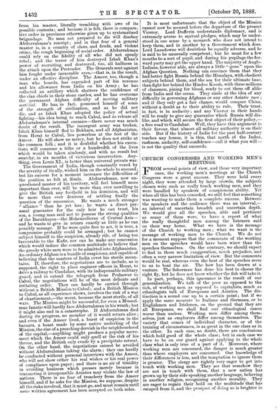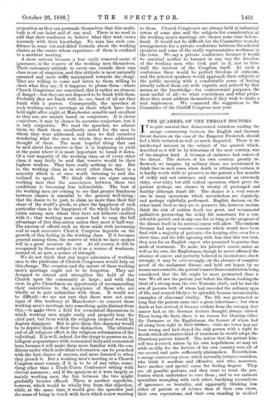CONGRESSES AND WORKING MEN'S MEETINGS. CHURCH F ROM several points of
view, and those very important ones, the working men's meetings at the Church Congress were a great success. They were held every night, they were attended by large crowds, the subjects chosen were such as really touch working men, and they were handled by speakers of conspicuous ability. Yet when all this has been conceded, we still feel that something was wanting to make them a complete success. Between the speakers and the audience there was an interval,— an interval of uncertain breadth and uncertain depth. We would give all the speeches, able and pertinent as many of them were, to have a report of what the really thoughtful men among the listeners said on their way home. What we have is the message of the Church to working men ; what we want is the message of working men to the Church. We do not for a moment suppose that the comments of the working men on the speeches would have been wiser than the speeches themselves. On the contrary, we should expect to find, in them much exaggeration, much prejudice, and often a very narrow limitation of view. But the comments would be real, whereas even the best of the speeches seem to us to beat the air. The bow has been drawn at a venture. The fisherman has done his best to choose the right fly, but he does not know whether the fish will take it.
In part, perhaps, this ignorance is the result of our generalisation. We talk of the poor as opposed to the rich, of working men as opposed to capitalists, much as ethnologists talk of Europeans and Asiatics. The dis- tinction is a sound one up to a certain point ; but if we apply the same measure to Italians and Germans, or to Englishmen and Irishmen, on the ground that they are all Europeans, we shall find our ethnological canon worse than useless. Working men differ among them- selves, just as employers differ among themselves. The variety that comes of individual character, or of the training of circumstances, is as great in the one class as in the other. In each case, no doubt, there are conclusions which hold good of the whole class ; but in each case we have to be on our guard against applying to the whole class what is only true of a part of it. Moreover, where working men are concerned, the danger is much greater than where employers are concerned. Our knowledge of their differences is less, and the temptation to ignore them is greater. The clergy are rightly very eager to get into touch with working men. They see that somehow they are not in touch with them, that a new nation has grown up by their side speaking another language, believing in another religion, recognising another morality. They are eager to regain their hold on the multitude that has proportion as they can persuade themselves that this multi- tude is of one heart and of one soul. There is no need to add that their readiness to believe what they wish varies inversely with their knowledge. No man has such con- fidence in some cut-and-dried formula about the working classes as the curate whose experience of them is confined to a mothers' meeting. A more serious because a less easily removed cause of ignorance, is the reserve of the working men themselves. Their customary attitude to every one outside their own class is one of suspicion, and this attitude is most naturally assumed and most stiffly maintained towards the clergy. They are willing to come and listen to them, willing to cheer what they say, if it happens to please them—where Church Congresses are concerned, this is rather an element of danger—but they are not disposed to be frank with them. Probably they are frank with no one, least of all are they frank with a parson. Consequently, the speeches at such working men's meetings as those which have been held night after night at Manchester, sensible and excellent as they are, are mainly based on conjecture. It is clever conjecture, it may by chance be accurate conjecture, but it is only conjecture. We read the speeches, we admire them, we think them excellently suited for the men to whom they were addressed, and then we find ourselves wondering what the men to whom they were addressed thought of them. The most hopeful thing that can be said about this reserve is that it is beginning to yield at the point where it is most important to break it down. Of a vast majority of the working class, as of every other class, it may fairly be said that reserve would be their highest wisdom. They have really nothing to say. But in the working class, as in every other class, there is a minority which is at once worth listening to and dis- inclined to speak. We think there are signs among working men that the association between these two conditions is becoming less indissoluble. The best of the working men are coming to see that greater frankness between classes is essential to the general well-being ; that the desire to be just, to claim no more than their fair share of the world's goods, to place the happiness of each particular class in the happiness of the whole body politic, exists among men whom they have not hitherto credited with it ; that working men cannot look to reap the full advantage of this disposition unless they meet it half-way. The success of efforts such as those made with increasing zeal at each successive Church Congress depends on the growth of this feeling in the working class. If it becomes general among them, the reserve of which we have spoken will in a great measure die out. At all events, it will be recognised by those subject to it as a source of weakness, instead of, as now, a source of strength.
We do not think that any larger admission of working men to the platforms of Church Congresses would help on this change. The occasion and the nature of these working men's meetings ought not to be forgotten. They are designed to extend and strengthen the hold of the Church upon the community at large ; and with that view, to give Churchmen an -opportunity of recommending their convictions to the acceptance of those who are wholly or in part unfamiliar with them. It would not be difficult—we are not sure that there were not some signs of this tendency at Manchester—to convert these working men's meetings into something quite distinct from this,—to make them a field for economical discussions in which working men might easily and properly bear the chief part, but from which the religious element would by degrees disappear. But to give them this character would be to deprive them of their true distinction. The ultimate end of all religious effort is the religious reformation of the individual. It is well, indeed, for the clergy to possess an in- telligent acquaintance with economical. facts and economical laws, because it will make them more familiar with the con- ditions under which individual reformation can be preached with the best chance of success, and more listened to when they preach it. But a working men's meeting at a Church Congress must remain, if it is to be of any value, some- thing other than a Trade-Union Conference sitting with clerical assessors ; and if the speakers at it were largely or mainly working men, the line between the two might gradually become effaced. There is another expedient, however, which would be wholly free from this objection, while, at the same time, it would give the speeches just the sense of being in touch with facts which is now wanting to them. Church Congresses are always held in industrial towns of some size, and the subjects for consideration at the working men's meetings are chosen some time before- hand. It would not be difficult for the Committee to make arrangements for a private conference between the selected speakers and some of the really representative workmen in the town. We say a private conference, because it would be essential neither to hamper in any way the freedom of the working men who took part in it, nor to fore- stall the interest of the Congress itself. At such a conference there would be perfect freedom of criticism, and the selected speakers would approach their subjects at the public meeting with a comfortable sense of having already talked them out with experts, and arrived by that means at the knowledge—for controversial purposes, the most useful of all—to what convictions and what preju- dices they must address themselves if they wish to make a real impression. We commend the suggestion to the Committee of the Cardiff Congress next year.



































 Previous page
Previous page